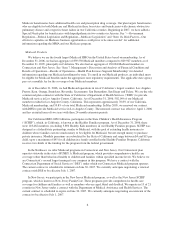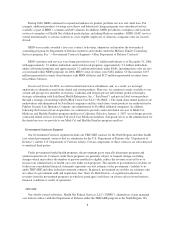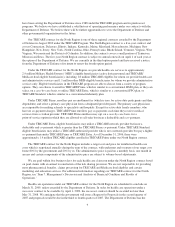Health Net 2006 Annual Report Download - page 18
Download and view the complete annual report
Please find page 18 of the 2006 Health Net annual report below. You can navigate through the pages in the report by either clicking on the pages listed below, or by using the keyword search tool below to find specific information within the annual report.independent, non-profit organizations that review and accredit HMOs. HMOs that comply with review
requirements and quality standards receive accreditation. Our Arizona, California, Connecticut, New Jersey and
New York HMO subsidiaries have all received NCQA accreditation with a score of “excellent,” which is the
highest score NCQA awards. Our MHN subsidiary has received URAC accreditation.
Government Regulation
Our business is subject to comprehensive federal regulation and state regulation in the jurisdictions in which
we do business. These laws and regulations govern how we conduct our businesses and result in additional
requirements, restrictions and costs to us. We believe we are in compliance in all material respects with all
current state and federal laws and regulations applicable to our businesses. Certain of these laws and regulations
are discussed below.
Federal Legislation and Regulation
Medicare Legislation. On December 8, 2003, the MMA was signed into law. This complex legislation made
many significant structural changes to the federal Medicare program and added a voluntary prescription drug
benefit, called a “Part D” benefit, which was made available to Medicare beneficiaries starting January 1, 2006.
The MMA changed the methodology for payment to private plans to a competitive bidding process
beginning in 2006. For the Medicare Advantage plans, the federal Centers for Medicare & Medicaid Services
(“CMS”) calculates county-specific payment rates based on fee-for-service costs in the county and a legislated
formula. These rates then serve as a benchmark against which we must bid for providing the Medicare package
of services. The projected savings from the benchmark rate is used 75% to fund additional benefits to members.
The remaining 25% is retained by CMS. CMS then pays us a monthly rate for each enrollee, which is the bid
amount, with risk adjustment for that member, plus the 75% of savings (if any) in the bid. The risk adjustment
factor reflects the member’s age, gender and health status. The MMA also authorized regional PPOs to serve 26
regions covering the U.S. and its territories, and authorized other products designed to provide a private market
option on a broader scale.
Our Medicare contracts are subject to regulation by CMS. CMS has the right to audit HMOs and PPOs
operating under Medicare contracts to determine the quality of care being rendered and the degree of compliance
with CMS’ contracts and regulations.
Medicaid and Related Legislation. Federal law has also implemented other health programs that are
partially funded by the federal government, such as the Medicaid program (known as Medi-Cal in California) and
SCHIP. They are largely regulated and administered by state agencies and thus there are variations in these
programs from state to state. Federal funding remains critical to the viability of these programs. Federal law
permits the federal government to oversee and, in some cases, to enact, regulations and other requirements that
must be followed by the states. Medicaid is administered at the federal level by CMS; SCHIP is administered by
the Health Resources and Services Administration, another arm of the Department of Health and Human
Services.
Privacy Regulations. The use of individually identifiable data by our businesses is regulated at the federal,
state and local level. These laws and regulations are changed frequently by legislation or administrative
interpretation. Various state laws address the use and maintenance of individually identifiable health data. Most
are derived from Health Insurance Portability and Accountability Act of 1996 (“HIPAA”) and the privacy
provisions in the federal Gramm-Leach-Bliley Financial Modernization Act of 1999 (the “Gramm-Leach-Bliley
Act”).
HIPAA and the implementing regulations that have been adopted in connection therewith impose
obligations for issuers of health insurance coverage and health benefit plan sponsors relating to the privacy and
16
























